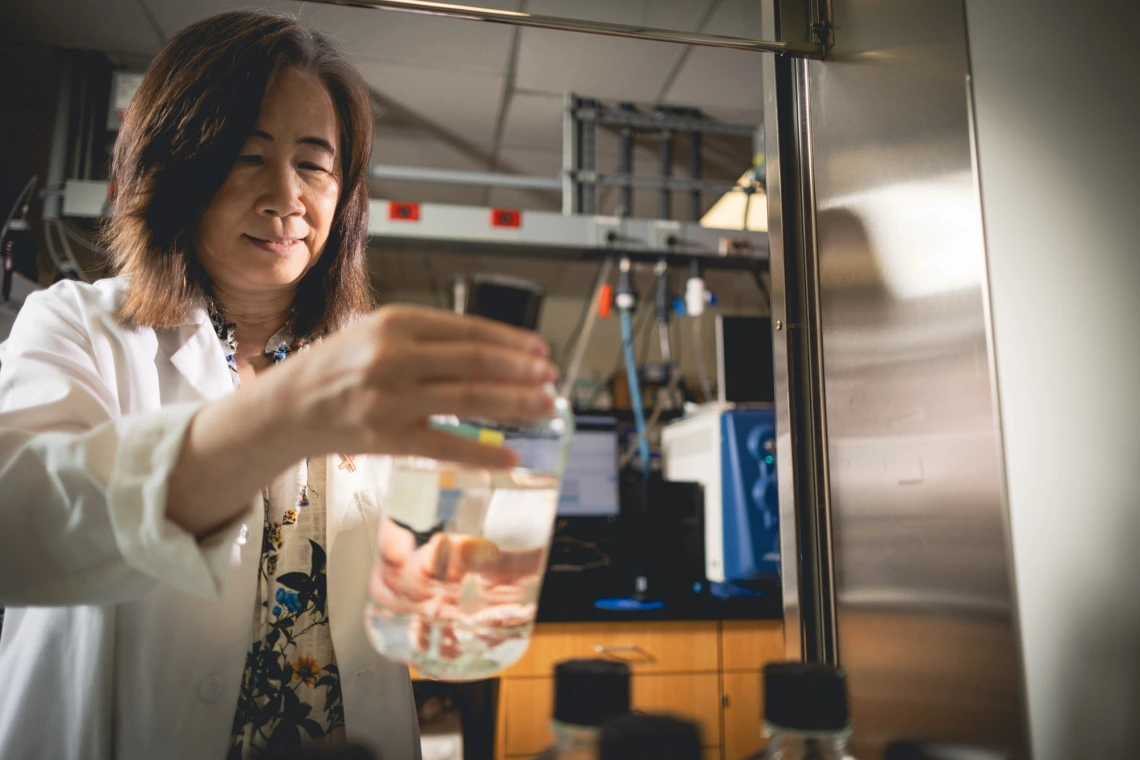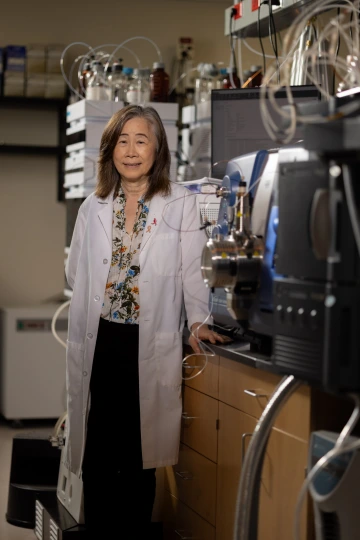Sherry Chow: Chemoprevention innovator advances U of A Cancer Center's impact on early-stage trials

In her 25-plus years at the University of Arizona Cancer Center, Sherry Chow, PhD, has made an impact far beyond her work with early-phase cancer prevention research trials.
The innovative Cancer Center member has vastly improved the lives of her students, post-doctoral fellows, coworkers and mentees with her calm, capable yet compassionate approach to both people and science. After serving the U of A College of Pharmacy for 10 years, Chow moved to cancer research after a meeting with U of A Cancer Center Director David Alberts, MD.
“He was the one that brought me into the cancer field,” Chow said of her mentor. “I felt like my background in pharmacy could contribute to early phase clinical trials in developing study agents that can be used for cancer prevention.”
Since that time, Chow, a research professor in the Department of Medicine at the U of A College of Medicine – Tucson, has made valuable contributions in early phase clinical development of cancer prevention agents. She has led the U of A Cancer Center early phase cancer prevention clinical trials program, which has been continuously funded through three competitive funding mechanisms by the National Cancer Institute, Division of Cancer Prevention.
From 2003, this program has received over $34 million to lead a consortium of institutions, including multiple comprehensive cancer centers, in conducting clinical investigations of various pharmaceutical and nutraceutical agents and vaccines for prevention of lung, breast, cervix, prostate, skin, colon, esophageal, and head and neck cancers.
She also founded and has led the Cancer Center Analytical Chemistry Shared Resource almost from the time she joined the cancer team.
Making a difference in chemoprevention

Sherry Chow, PhD, in her lab at the U of A Cancer Center.
“My passion is with breast cancer prevention. But in this Clinical Trials Program, I get to work with different organ systems, different investigators and different fields,” she said. “It's exciting because you get to learn so many different things.”
Chow said that the Clinical Trials Program has helped to provide the training for Cancer Center trainees in different levels, so they get exposure in early phase clinical trials for cancer prevention.
“This program actually sets our Cancer Center apart from the other cancer prevention and control programs,” she said.
“Dr. Chow is an international leader in cancer prevention research and an asset to our institution as the principal investigator of the Cancer Prevention Clinical Trials Network with the NCI Division of Cancer Prevention,” said Clara Curiel-Lewandrowski, MD, co-director of the University of Arizona Skin Cancer Institute, interim director of research for the U of A Cancer Center and professor of dermatology in the U of A College of Medicine. “Her experience in biomarker discovery and effective implementation of interventional strategies for cancer prevention across multiple organ sites is unique.”
Curiel and Chow are conducting a study in organ transplant patients who are immunosuppressed and at high risk of developing skin cancer. The researchers are testing a novel topical immunotherapy to see if it can be helpful for skin cancer prevention.
Curiel said that Chow is gifted at designing and executing prevention trials. Through her clinical and translational research studies, she identifies potential targets for cancer prevention and evaluates chemoprevention strategies. She has led several clinical trials to evaluate the potentials of different dietary compounds, repurposed drugs, and modified dosing schedules of established drugs for breast cancer prevention.
Beyond Chow’s immense talent, Curiel said she enjoys working with her.
“Her thoughtful, assertive, and kind leadership style has been a role model to many of us fortunate to work with her,” Curiel said.
Beginning in pharmacokinetics
Chow, who hails from Taiwan, received a bachelor’s in pharmacy at Taipei Medical College. She moved to the New York for her graduate program in pharmacokinetics at University at Buffalo. Chow said that pharmacology and pharmacokinetics are distinct.
“Pharmacology is trying to understand how drugs act on the body,” Chow said. “Pharmacokinetics is trying to understand how the body acts on a drug, how the body absorbs the drug, metabolizes and excretes it.”
A distinguished career in cancer prevention trials
Chow said that decades ago, the NCI supported a few large, expensive phase 3 cancer prevention trials, examining trace minerals such as selenium and micronutrients such as beta-carotene.
Unfortunately, the trials did not show substantial results. Chow said that these null results did not mean that the cancer prevention methods were ineffective, but that they required more rigorous, early phase data that examined the appropriate participants, correct dosages and strong surrogate biomarkers to build a more effective late-stage trial.
“Doing early phase trials, we can address a lot of questions and provide some ‘go,’ ‘no go’ decisions to move the agents into those large, definitive studies,” she said.
For example, Chow said that for their prostate cancer prevention trial, conducted in the window of time before prostate surgery, allows them to examine the effects of the preventive agents at the tissue level. They are currently examining an androgen receptor inhibitor, apalutamide, that has already been approved to treat advanced prostate cancer. By using this type of study design, they can conduct a short-term intervention to see whether a small dose of apalutamide is effective in reducing PSA, which is a marker of prostate cancer.
“We can try to intervene in an individual at risk and examine early clinical efficacy by looking at the target tissue for surrogate biomarkers in order to understand the potential activity of the agent on this population,” she said.
Chow has been working with Aaron Scott, MD, and Joshua Melson, MD, on a Lynch Syndrome collaborative project involving 16 cancer centers led by the University of Kansas. Lynch Syndrome is the most common hereditary colon cancer syndrome, affecting more than 1.2 million people in the U.S.
Through the study, researchers are testing a preventive vaccine series that uses a combination of three vaccines, called Tri-Ad5, combined with a protein, N-803, that boost the body’s own immune system to prevent polyps and cancers.
“Dr. Chow’s efforts to grow our cancer prevention program at UACC have been truly outstanding,” said Scott, associate professor in the U of A Department of Medicine and co-lead of the Cancer Center Clinical and Translational Oncology Program. “Her leadership has helped to establish UACC as a national recognized institution for excellence in cancer prevention and has brought novel, cutting edge trials such as our Lynch Syndrome TriAd-5 vaccine trial.”
Melson said he has been at the University of Arizona a relatively short time but feels fortunate to work with Chow.
“She has such a great understanding of running clinical trials,” said Melson, a clinical professor in the University Department of Medicine and Cancer Center member in the Cancer Prevention and Control Program. “She is able to navigate the complex environment of getting clinical trials underway in such a pleasant and thoughtful manner; it's just such a joy to work with her.”
Chow has also been working on two prevention studies using broccoli seed and sprout extract in pill form: one with heavy smokers and one with firefighters. The researchers test urine samples for biomarkers.
“We're trying to see whether this broccoli shot can be effective in enhancing that detoxification of carcinogens, the cancer-causing chemicals," Chow said. "We can see whether this intervention can help the body to clear out those cancer-causing chemicals more rapidly.”
Giving back
Chow and her husband, Regents Professor Hsinchun Chen, University of Arizona Management Information Systems and the Thomas R. Brown chair in management and technology in the Eller College of Management, are highly committed to University of Arizona students and building their futures.
Together, they sponsored the Chen-Chow Bear Down Scholarship in 2020 at U of A Eller College of Management. The scholarship is to engage underrepresented students from Native Nations in the Eller College’s Management Information Systems department. In its first year, it awarded eight scholarships to students.
Mentoring
Caring about students is not new for Chow. For 35 years, In addition to participating in more than 100 peer-reviewed journals, Chow has invested in students, mentoring nearly 100 undergraduate, graduate, predoctoral students and postdoctoral fellows.
“We need to grow the next generation of scientists. Participating in those mentoring programs, I think, is so critical,” she said.
She said that research leaders must help aspiring scientists advance their interest in science, in cancer, and cancer prevention.
“It brings joy to my job to be able to interact with the students, trying to understand their background, their interests,” she said. “And PhD students––you've spent so much time with them––they're like family.”
Edgar Tapia, PhD, a molecular science liaison at Caris Life Sciences, said he met Dr. Chow during a critical period of his graduate school journey when he was not sure he would be able to continue with his studies.
“I was first drawn to her lab hoping to learn more about clinical trial research and cancer prevention, and luckily for me, she opened the doors of her lab to me,” he said. “She is a pleasure to work with and is someone who leads by example. I always learned from Dr. Chow’s insightful questions, the feedback she provided, and the way she was able to gracefully manage so many different projects while being a mentor for many trainees.”
Tapia said Chow creates a welcoming environment where students can learn, develop new skills and flourish.
“I was always inspired by Dr. Chow’s work ethic, her calmness in every situation, and how she was always willing to help everyone,” he said. “I believe that everyone involved in Dr. Chow’s lab was proud to be part of her team and eager to contribute our part to her lab.”
Liane Pinto, PhD, said she first met Chow in 2019 when the student started her rotation at her Cancer Prevention Lab during her postgraduate training.
“As a medical oncologist by formation, I was able to learn diverse wet and dry lab techniques as well as observe the conduct of several cancer prevention clinical trials,” she said. “Dr Chow’s focused work, brightness, calmness, kindness, and inspiring leadership called my attention since the beginning of my journey.”
Chow said that she hopes her students take a few lessons with them when they rise in their careers.
“Always be willing to learn new things and be systematic in analyzing and answering your questions,” Chow said. “Willingness to collaborate and perseverance are also important. Getting funding is so hard, so you just have to keep trying.”



